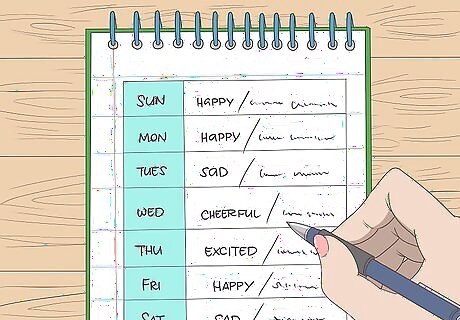
views
Telling Someone They’ve Hurt Your Feelings

Think about what you’re feeling and why. Before you approach someone to tell them that they’ve hurt your feelings, identify exactly why you feel hurt. It’s important to specify a concrete reason for your hurt feelings so that you can express this to the person who hurt you. If you’re unsure about why you feel hurt, review what happened in your mind or write about it. For example, maybe the person hurt your feelings when they asked a question about your weight, or perhaps they hurt your feelings by not doing something, such as not calling you or not showing up when they said they’d meet you somewhere.

Take a few deep breaths and try to relax. If you’re feeling overwhelmed by your emotions, take a few deep breaths in and out before speaking with the person. Talking to them when you’re feeling angry, stressed, or tearful can make matters worse. You may find it hard to communicate what you’re feeling if you are overcome with emotions. If taking deep breaths doesn’t seem to help, try taking a brisk walk or doing pushups. This will help to release endorphins and clear your head.

Use “I” statements to communicate what you’re feeling. Avoid blaming the person for how you feel. Instead, express what you’re feeling by using “I” instead of "you." Explain the issue in an objective way. This will be less likely to put the person on the defensive. For example, you might say, “I felt hurt that I didn’t get a call to tell me you couldn’t make it yesterday.” Or, you might say, “It hurts my feelings when I am criticized about my weight.”

Listen carefully to the other person’s response. After you express how you feel, give the person a chance to respond. Listen to what they have to say with your full attention. Maintain eye contact, face them, and put away anything that might distract you, such as your phone, tablet, or computer. Encourage the person to keep talking and show them that you’re listening by using leading language, such as “I see,” “go on,” and “mmhmm.” You can also nod your head to show that you’re listening. If anything the person says is unclear, ask them to clarify, such as by saying, “What did you mean when you said you were having a bad day?”Tip: Be aware of your body language while you are talking to the person. Avoid crossing your arms, turning away from the person, or scowling as these behaviors will send the message that you’re angry and this may cause the other person to feel angry as well.

Identify anything that might make you feel better. If there’s something the person can do to prevent a similar situation in the future, tell them what it is. Be specific about what you’d like the person to do or say differently moving forward. This may help to prevent you from having your feelings hurt in a similar way. For example, if the person hurt your feelings by not meeting you when they said they would, you might say something like, “If you expect to work late again when we have plans to meet up, can you text me to let me know?” Or, if the person made a hurtful comment about your weight, you might say, “Please don’t mention my weight in the future. It stresses me out and I’d just rather not talk about it.”
Writing About Your Hurt Feelings

Write a letter to the person who hurt your feelings, but don’t send it. If you cannot or don’t want to talk to the person about your feelings, try writing a letter to them that you do not send. In the letter, tell the person how they hurt your feelings and what you would like them to have done or said differently. After you finish the letter, tear it up or burn it in a fireplace as a symbolic way to release the feelings. This strategy may be especially useful for situations where talking to the person is not an option at all. For example, you might write a letter to your boss if they hurt your feelings, or you might write a letter to a deceased parent or guardian who hurt your feelings with their words or actions.

Record how you feel daily in a journal or diary. If talking with the person is not an option, you may also express your feelings in words by writing them down. Try starting a journal or diary where you can record your feelings daily. You could also try using a journaling app on your phone to keep track of how you’re feeling. For example, if someone hurts your feelings at school, write about what happened in your journal. Include as many details as you can remember about what happened.Tip: You might also use the journal to record positive feelings, such as by making lists of things you feel grateful for. This might help you to stay focused on the positives in your life.

Create a poem to express how you’re feeling. Poetry allows you to put your emotions into words in an abstract way. If you enjoy writing poetry, express your hurt feelings in the form of a poem. Try writing your poem in any way that you like, such as in couplets or free verse. You don’t even need to rhyme or incorporate a fancy structure to write poetry. If you’re into music, you could also try writing a song about your hurt feelings.
Expressing Your Hurt Feelings in Other Ways

Draw or paint a picture about your feelings. If you’re more into art than writing, you can also use that medium to express your hurt feelings. Draw or paint a picture about what happened, or create an abstract image based on how you feel. If you’ve never tried drawing or painting, try taking an art class or just get a pencil and piece of paper and see what you can do!

Sing or play music to express your hurt feelings. If you’re musically inclined, try singing or playing a song that helps you express the emotions you’re feeling. You can use a song that you wrote yourself, or pick one by an artist that speaks to you. Even listening to music may help you to feel better by comforting you and reminding you that you’re not alone. Choose songs that reinforce the way you feel and take some time to enjoy them.

Go for a brisk walk or do another form of exercise to relieve stress. Exercise won’t allow you to express your feelings in words, but it might help you to process what you’re feeling. By the time you finish your walk or workout, you might already feel better. Make sure to choose an activity that you enjoy so that it will be fun for you. For example, if you enjoy swimming, go for a swim. If you like to dance, play some music and dance around in your bedroom.

Meditate and note the physical sensations of your emotions. Meditation can help to relax you and focusing on any physical sensations related to your hurt feelings may help you to release those feelings. Sit or lie somewhere comfortable, close your eyes or focus on an object or candle, and stay in this state for 5 minutes or longer. Focus on where you are feeling hurt in your body and breathe into those areas. For example, you might notice tension in your chest, a knot in your stomach, or an ache in your shoulders. Breathe deeply into each of these areas to release the tension. If you’re new to meditation, try using a guided meditation to help you stay focused.




















Comments
0 comment